Seniors tour new Therkildsen facility before graduating

Project superintendent Steve Massa of Story Construction (right), explains the features of a third floor flex lab to graduating industrial and manufacturing systems engineering seniors during a tour of the Therkildsen Industrial Engineering Building Wednesday afternoon. Photos by Christopher Gannon.
As part of the last class session during their last semester as industrial and manufacturing systems engineering (IMSE) undergraduates, students in teaching professor David Sly's capstone course section received a special tour Wednesday afternoon of the nearly completed Therkildsen Industrial Engineering Building. Nearly all class members are graduating this week, but this was no farewell tour; rather, one more learning opportunity for this group of young engineers.
Project superintendent Steve Massa of Story Construction and ISU construction manager Danelda Allen took time to, for example, show off the fourth-floor mechanical room and explain how the air handling system was lifted into place by crane in six wrapped pieces -- the largest weighed 22,000 pounds -- and protected until the structure was enclosed and the system could be assembled. Or to explain how the project job board works, what all those colored notes mean and how the team relies on daily communication to juggle all the variables in any project and keep the work on schedule. Or to point out the modern features in the capstone lab, the high bay labs or the flex lab -- stuff like lights that self-regulate in response to available daylight or the appropriate flooring for the activities in each lab.
For Allen, herself an alumna of the IMSE department, the tour was special, too. In her seven years as a construction manager on campus, she's coordinated some big projects -- a multi-summer effort to replace 2,000+ windows in Friley residence hall was one -- but Therkildsen is the lone new building project she'll oversee from start to finish. She expects to retire before spring arrives.
Office furniture gets ordered by the end of the month, the "punch list" small projects and corrections should be done by mid-January and the information technology team will arrive to install all sorts of communication and design technology.
"It's a good feeling" to have been the construction guardian of her old department's new facility, she said.
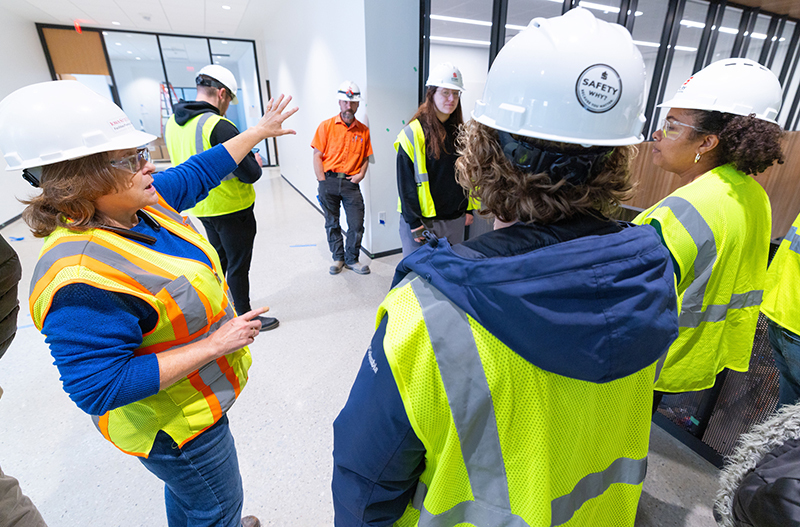
Construction manager Danelda Allen (left), explains a second-floor area to students touring the Therkildsen Industrial Engineering Building Wednesday.
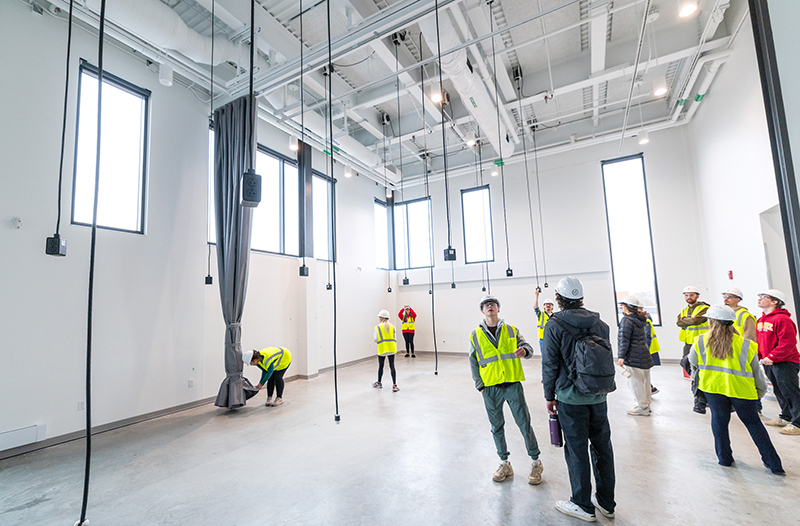
Students investigate in the third-floor high bay lab at Therkildsen Industrial Engineering Building.
Iowa State celebrates fall graduates, provides support in the final stretch
For some Iowa State students graduating this semester, the milestone is even more meaningful because of the financial support they received in the final stretch to earn their degree.
Every semester, the university provides completion grants to seniors at risk of not completing their degree due to financial difficulties. Over the past five years, the university has provided $3 million in completion grants to more than 1,500 students. Iowa State's First Scholars Office, which is an initiative supported by the strategic plan, offers grants to cover expenses such as tuition, books, housing, transportation and emergency expenses.
The grants are a game-changer for students. The First Scholars Office has received many notes of gratitude, similar to the one below, from students sharing how the grant helped them cross the finish line.
"Without this grant, I likely would've had to move back home with nothing to show for my time at Iowa State. I am the oldest of 3 siblings, of which 2 of us are currently in university . . . Having received this grant has not only ensured that I graduate on time but also that there's enough financial resources for my siblings as well. I will eternally be grateful for having received this amazing opportunity."
Students helping students
Several first-generation students will have the opportunity to participate in fall commencement ceremonies after receiving free academic caps and gowns. Past graduates donated their caps and gowns that were then distributed through First Scholars.
Students who would like to donate their caps and gowns will find donation bins at the north, south and west entrances of Hilton Coliseum at the conclusion of their graduation ceremony. They can place their items in a bin or grab a postage-paid envelope near the bin to mail in their regalia at a later date.
University ceremonies
Fall graduates will celebrate their achievements during commencement ceremonies at Hilton Coliseum on Dec. 20-21.
An estimated 1,408 bachelor's degree recipients will be honored during a 1:30 ceremony on Saturday, Dec. 21. An estimated 245 master's and 110 doctoral students will be honored at 7 p.m. on Friday, Dec. 20. For those who cannot attend, a livestream is available:
More celebrations
The six undergraduate colleges will honor graduating students at their own convocations and receptions on Friday or Saturday morning:
- Agriculture and Life Sciences, 9 a.m. Friday, Dec. 20, Hilton Coliseum
- Health and Human Sciences, 1 p.m. Friday, Dec. 20, Stephens Auditorium
- Ivy College of Business, 4 p.m. Friday, Dec. 20, Hilton Coliseum
- Liberal Arts and Sciences, 4 p.m. Friday, Dec. 20, Stephens Auditorium
- Design, 5 p.m. Friday, Dec. 20, Kocimski Auditorium, 101 Design
- Engineering, Dec. 20-21, times and locations vary by department
Commencement speakers
Kimberly Ryan, president and CEO of Hillenbrand, Inc., will give the commencement address for the undergraduate ceremony. Hillenbrand is a global provider of highly engineered, mission-critical, processing equipment and systems to customers in over 100 countries. As CEO, Ryan champions Hillenbrand's Purpose to Shape What Matters For Tomorrow, uniting more than 10,000 global employees who are driven to innovate to meet the future needs of a world that's continually changing.
Ryan was raised in Ottumwa and received her bachelor's degree from Iowa State in 1989. As a student, she served as president and treasurer of Alpha Phi, was active in business clubs and worked as an auditor for a local hotel chain. Ryan has served on the Dean's Advisory Council in the Ivy College of Business since 2022.
Robert C. Brown, Anson Marston Distinguished Professor in Engineering and Gary and Donna Hoover Chair in Mechanical Engineering, will speak at the graduate ceremony. Brown is the founding director and current co-director of the Bioeconomy Institute. His research focuses on advanced biofuels, plastics upcycling and carbon negative energy. Brown has written more than 300 scientific papers and has been awarded 26 U.S. patents.
Most recently, Brown established a brewing science program and brewing laboratory at Iowa State. The program offers course work to ISU students, outreach to Iowa breweries and research and innovation in brewing science. Brown secured a native brewery license for the program and has started wholesaling beer produced in a two-barrel brewhouse in the laboratory.
Parking information
Parking is available between Hilton Coliseum and Jack Trice Stadium and in the lots north of Hilton and the Scheman Building. Additional parking is available at Jack Trice Stadium and Maple Willow Larch. Handicap parking is available in lot C2, directly south of Hilton.
Five questions with the chief faculty marshal
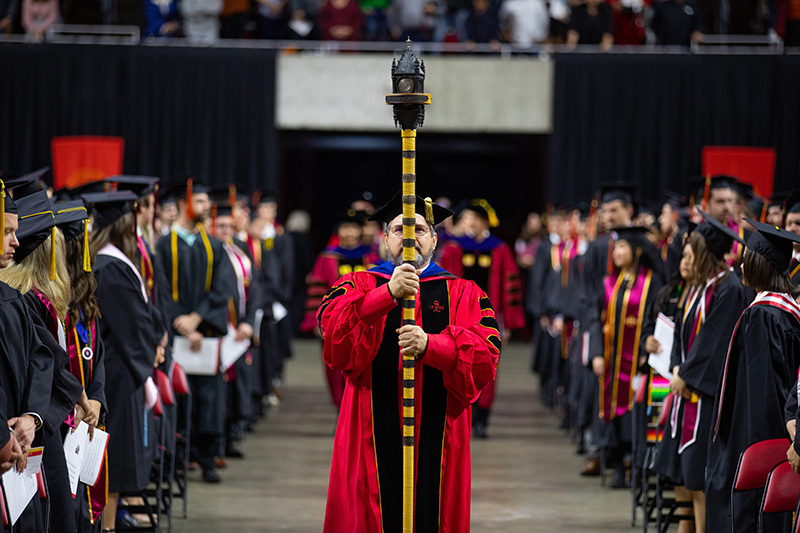
Chief faculty marshal Rob Wallace carries the official university mace, symbolizing the authority of the university president, during a commencement ceremony. The chief faculty marshal carries it at the head of the academic procession and, in placing it on its stand, signals the beginning of the ceremony. Photo by Christopher Gannon.
Rob Wallace, associate professor in ecology, evolution and organismal biology, will don a different cap this weekend as the chief faculty marshal during commencement ceremonies. Friday's graduate college ceremony will mark his 100th as a marshal at Iowa State. The first was in 1999. Currently, 29 faculty members serve as marshals at graduate and undergraduate ceremonies to help make the most of the students' big day. Wallace spoke with Inside about being a marshal.
What do marshals do?
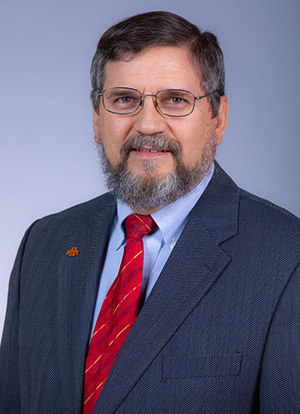
Rob Wallace
The marshals, who come from all the colleges on campus (except Vet Med, which has its own ceremony), are tasked to count and seat students, row by row, as they process in. Marshals are responsible for moving students by college to the stage from where they're seated and making sure they have the reader's card, pass through the photo stations and are ready to receive their diploma. Marshals also are responsible for organizing the recessional to get faculty and others off the stage. Marshals have extra responsibilities for the graduate ceremony that may include the hooding ceremony for doctoral candidates.
What was your path to becoming a commencement faculty marshal?
I started as a convocation marshal for the College of Liberal Arts and Sciences. There was a call for people who were interested, and throughout my life commencement has been a big deal -- from eighth grade on. I spoke at eighth grade commencement, gave the valedictorian address in high school and the welcome address when I graduated college. I like to preserve the traditions of the institution and see that they are carried out effectively.
It is an unusual service because there is no obligation to do it. It is purely voluntary and I believe the marshals -- many who have done it for 15 years or more -- enjoy seeing students complete that accomplishment of hearing their name and walking across the stage. It's a satisfying component of being a faculty member. Everyone is happy on commencement day!
What's the significance of the gowns marshals wear?
With a few exceptions, all marshals wear the doctoral gown of the university from which they received their Ph.D. Collectively, they represent the essence of what a university is about by bringing faculty together from many places to share knowledge. You'll see lots of different colors. The one I've worn for many years is from Rutgers University. When former President (Gregory) Geoffroy got here, Iowa State's doctoral gown was just black. He used the Rutgers gown as a model for the current Iowa State gown, which the university president and senior administrators wear for the ceremony.
What's the key to a successful commencement?
A large group of volunteers. Registrar Jennifer Suchan orchestrates the commencements with extremely detailed plans to have everything run well. There's a bevy of volunteers coming from academic advising or other areas to help with student check-in at Hilton Coliseum. The entire staff of the office of the registrar is charged with carrying out the physical execution of the ceremonies, and the staff at Hilton also make it possible. This is a spectator event, so we want to make it look organized.
Share a few highlights from 25 years as a faculty marshal.
I have had students I coached in soccer or baseball when they were 11 or 12 years old give me a bear hug on stage. My son graduated in the rain in Jack Trice Stadium in spring 2021. I didn't know he was coming, so the most satisfying moment was when I got a hug from him as he walked across the stage to get his diploma. Seeing students or advisees complete their degrees after some academic concerns that we helped them through is very satisfying.
Winter session, winter break begin Dec. 23
Iowa State's winter session for undergraduates, now in its fifth year, drew interest from approximately 1,260 students for about 50 courses. They'll begin class online on Monday, Dec. 23, and wrap up their work on Friday, Jan. 17. As of late last week, upper-division students accounted for 68% of enrolled students, including 445 seniors and 412 juniors. This is consistent with the first four winter academic sessions. Nearly 80% of the courses offered are 2000- or 3000-level, with a handful each of 1000- and 4000-level classes.
A priority during the four weeks is staffing levels that support a successful winter session for enrolled students. Most students are not in Ames but have access to academic support and student services online.
Winter session timeline:
- Monday, Dec. 23: Winter session (online) begins
- Tuesday, Dec. 24, through Thursday, Dec. 26: University holidays
- Wednesday, Jan. 1, 2025: University holiday
- Friday, Jan. 17: Winter session concludes
- Monday, Jan. 20: University holiday
- Tuesday, Jan. 21: Spring semester begins
Winter enrollment*
|
Students |
Headcount |
|
Seniors |
445 |
|
Juniors |
412 |
|
Sophomores |
265 |
|
First-year |
134 |
|
Non-degree seeking |
5 |
|
Total |
1,261 |
*as of Dec. 13, source: registrar's office
Prep your space before you depart
Winter session aligns with the break between semesters, Dec. 23-Jan. 17. As shared in October, to promote time off, units may reduce services and develop schedules that align with Staffing Guidance for University Breaks. Units open during the winter break may implement break office hours (7:30 a.m.-4 p.m.).
Faculty and staff who will be out of the office over the holiday break should make sure their workspace is in safe and energy-saving mode before they depart. Employee attention to these details will minimize risks and prevent potential issues. Here are some tips:
- Check windows to make sure they're tightly closed and locked. Leaving windows even slightly open during cold weather can cause significant problems for a building's pipes and systems. If a pipe freezes and bursts, it can result in extensive water damage.
- Lock doors and close fire doors.
- Shut down all computers, printers and other accessories. Leave office computers on if needed for remote access or critical operations but turn off connected devices.
- Turn off and unplug appliances and electronics such as copiers, space heaters, coffee pots, microwaves, desk lamps, radios and chargers for electronic devices.
- Make sure faucets in restrooms and break rooms are turned off and not dripping. If you notice a dripping faucet, contact facilities planning and management's service center, 515-294-5100.
- Turn off office lights and public lighting in areas such as hallways, restrooms and conference rooms.
- Shut down unnecessary climate-controlled plant growth chambers and close fume hood sashes completely, if possible.
- Make sure exterior doors close securely when you exit (or enter) a building.
Changes to service hours
Below are schedule changes for some campus services over the semester break.
Open Dec. 23 and 27 (8 a.m.-noon, no deliveries). Closed Dec 24-26, Jan. 1. Open weekdays Dec. 30-Jan. 17 (7:30 a.m.-4 p.m.).
Break schedule in effect Dec. 21-Jan. 19, eliminating some routes and reducing frequency on others. No service Dec. 25 and Jan. 1. No Moonlight Express Dec. 20. Service ends at 6 p.m. Dec. 24 and Dec. 31.
Student health and wellness
Student Counseling Services and Thielen Student Health Center open weekdays 7:30 a.m.-4 p.m. Closed weekends. Closed Dec. 24-26, Jan. 1.
Open weekdays 9 a.m.-5 p.m., Saturdays 10 a.m.-4 p.m. and Sunday, Dec. 22, noon-4 p.m. Closed Dec. 24-25, Dec. 28-29, Jan. 1, Jan. 5 and Jan. 12.
Closed Dec. 22-Jan. 7. Select retail dining locations begin opening Jan. 8. See online schedule for hours and menus.
Open weekdays 7:30 a.m.-5 p.m., weekends noon-4 p.m. Closed Dec. 24-26, Jan. 1.
See online schedule for reduced hours Dec. 21-Jan. 19 and library department hours. Closed Dec. 24-26, Dec. 28-29, Jan. 1, Jan. 4-5, Jan. 18 and Jan. 20.
See online schedule for reduced hours Dec. 21-Jan. 20 (State pool and Lied Recreation closed during this time). State Gym and Beyer Hall open weekdays 6 a.m.-8 p.m. and weekends noon-6 p.m. Beyer pool open 11 a.m.-1 p.m. on Dec. 23, Dec. 27, Dec. 30-31 and weekdays Jan. 2-17. Office and all facilities closed Dec. 24-26 and Jan. 1.
Normal winter hours 10 a.m.-4:30 p.m. daily. Open 5-9 p.m. for Winter Wonderscape holiday light show Dec. 21, Dec. 23 and Dec. 26-Dec. 28. Closed Dec. 24-25 and Jan. 1.
Stephens Auditorium ticket office
Closed Dec. 23-Jan. 1. Tickets may be purchased via www.ticketmaster.com.
See online schedule for reduced building and Makerspace hours Dec. 23-Jan. 20. Closed Dec. 22, Dec. 24-26, Dec. 28, Jan. 1 and Jan. 20.
Kiosk and fuel pumps available 24/7. Call after-hours line at 515-509-1686 with emergencies. Office closed Dec. 21-Jan. 1.
All galleries closed Dec. 23-Jan. 20. Office closed Dec. 24-26, Jan. 1 and Jan. 20.
Strategic plan revisions required for DEI law compliance
The state Board of Regents has directed the regent universities to update any portions of their strategic plans that pertain to diversity, equity and inclusion (DEI) to comply with Iowa Senate File 2435. The legislation prohibits DEI offices at the regent universities and prohibits individuals from performing DEI work as broadly defined by the law and with limited exceptions.
President Wendy Wintersteen established an advisory committee, chaired by senior advisor to the president Sophia Magill, to review and recommend revisions to the university’s strategic plan. The 15-member committee met twice and has provided its recommendations to the president and senior leaders.
All regent universities are required to submit their revised plans for consideration at the board's February meeting. The board also is reviewing its strategic plan.
Members of the advisory committee are:
- Sophia Magill, senior advisor to the president; and committee chair
- Erin Baldwin, associate vice president for student health and wellness
- Wren Bouwman, graduate student in English; and president, Graduate and Professional Student Senate
- Jason Follett, academic advisor, College of Engineering; and president, P&S Council
- Matt Frank, professor of industrial and manufacturing systems engineering
- Connie Hargrave, associate dean, College of Engineering
- Martin Hursh, undergraduate in economics; and president, Student Government
- Steve Lonergan, Morill Professor of animal science
- Susan McNicholl, communications specialist, office of the vice president for research; and P&S Council representative
- Heather Paris, associate vice president for financial support services
- Raj Raman, Morill Professor of agricultural and biosystems engineering
- Luis Rico-Gutierrez, dean, College of Design
- Kipp Van Dyke, associate dean of students
- David Wong, chair of veterinary clinical sciences
- Arnold Woods, program specialist, College of Liberal Arts and Sciences
Staff support was provided by Kim McDonough, strategic initiatives project specialist.
Senior leadership team:
- Wendy Wintersteen, president
- Jason Keith, senior vice president for academic affairs and provost
- Toyia Younger, senior vice president for student affairs
- Sean Reeder, senior vice president for operations and finance
- Kristi Darr, vice president for university human resources
- Mike Norton, general counsel and chief risk officer
Kellogg named TRIO student support services director
Japannah Kellogg has been named TRIO student support services director, effective Jan. 1. The appointment follows a fall semester search led by the dean of students office.
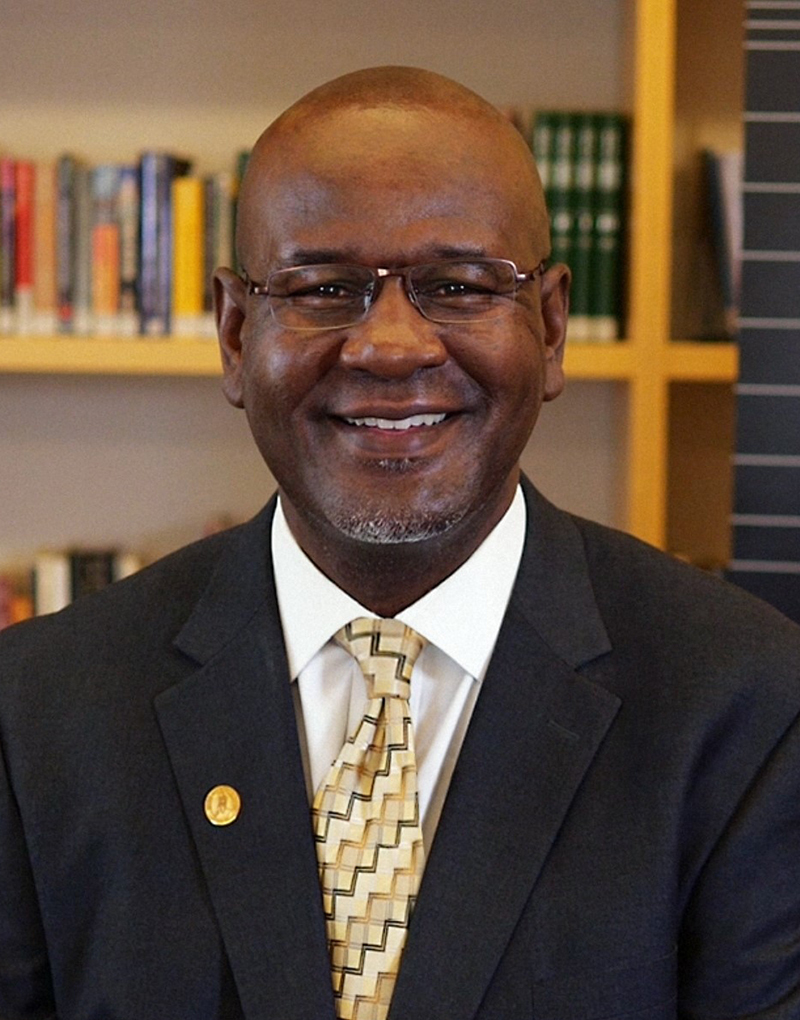
Japannah Kellogg
Kellogg previously served as TRIO student support services director from 2003 to 2017. For the past seven years, he served as director of the NCORE-ISCORE office.
Rob Lipsey, who served as TRIO director since 2018, will now provide oversight for both the TRIO Student Support Services office and the First Scholars Office. The two programs, part of the dean of students office, are housed in the recently renovated third floor of the Memorial Union, in Room 3220.
Funded by the U.S. Department of Education, TRIO student support services serves low-income, first-generation students and students with disabilities with the goal of increasing persistence and graduation rates. Students receive academic support, career preparation and financial literacy resources, and develop academic, social and professional skills that are transferrable beyond graduation.
For FY24, TRIO attained a persistence rate of 97% for the students it serves, 12% higher than the U.S. Department of Education's target rate. Eighty-eight percent of students served by Iowa State's program earned bachelor's degrees in FY24, 16% higher than the federal target rate.
The First Scholars Office serves first-generation and low-income ISU students, supporting them in reaching their full academic and career readiness potential. The office provides academic and personal support services, mentorship, financial support and assistance, and equips students with the tools and support needed to persist academically and to thrive after college.
